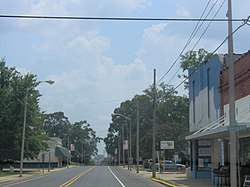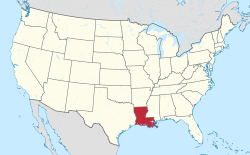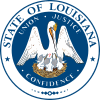Pineville, Louisiana
Pineville, Louisiana | |
|---|---|
City | |
| City of Pineville | |
 | |
 Location of Pineville in Rapides Parish, Louisiana. | |
 Location of Louisiana in the United States | |
| Coordinates: 31°20′20″N 92°24′45″W / 31.33889°N 92.41250°WCoordinates: 31°20′20″N 92°24′45″W / 31.33889°N 92.41250°W | |
| State | Louisiana |
| Parish | Rapides |
| Government | |
| • Mayor | Clarence R. Fields |
| Area | |
| • Total | 13.13 sq mi (33.99 km2) |
| • Land | 12.60 sq mi (32.64 km2) |
| • Water | 0.52 sq mi (1.36 km2) |
| Elevation | 118 ft (36 m) |
| Population (2010) | |
| • Total | 14,555 |
| • Estimate (2019)[2] | 14,122 |
| • Rank | RA: 2nd |
| • Density | 1,120.70/sq mi (432.72/km2) |
| Time zone | UTC-6 (CST) |
| • Summer (DST) | UTC-5 (CDT) |
| Area code(s) | 318 |
| FIPS code | 22-60530 |
| Website | www.pineville.net |
Pineville is a city in Rapides Parish, Louisiana, United States. It is located across the Red River from the larger Alexandria. Pineville is hence part of the Alexandria Metropolitan Statistical Area. The population was 14,555 at the 2010 census. It had been 13,829 in 2000; population hence grew by 5 percent over the preceding decade.[3]
The Central Louisiana State Hospital, the Pinecrest Supports and Services Center, the Huey P. Long Memorial Hospital (closed), the Alexandria Veterans Administration Medical Center, and the Alexandria National Cemetery are all located in Pineville. The city is also home to several large non-government employers including Baker Manufacturing, Procter & Gamble, Crest Industries, and Dresser Industrial Valve.
Original LSU in Pineville[]
Louisiana State University was founded by the Louisiana General Assembly in 1853. It was founded under the name Louisiana State Seminary of Learning & Military Academy and was located near Pineville. The first academic session began on January 2, 1860, with General William Tecumseh Sherman of Ohio as superintendent.
The academy opened for its fourth session in November 1862 with 112 students. Superintendent William A. Seay found the task of holding the cadets in class hopeless. According to historian John D. Winters of Louisiana Tech University:
The undisciplined young cadets with their enthusiasm for war were a continuous source of trouble. Around April 1, 1863, the cadets decided to close the school. They broke into the kitchen, smashed all the furniture, and seized all the cutlery, dishes, pots and pans, dumping them into the well. Most of the students then went home to volunteer. Professor Seay was able to keep a few students until April 23, when the excitement of the approach of Banks's army caused him to close the school and send the cadets home to fight."[4]
Geography[]
Pineville is located at 31°20′20″N 92°24′45″W / 31.33889°N 92.41250°W (31.338781, -92.412485).[5]
According to the United States Census Bureau, the city has a total area of 12.1 square miles (31.3 km2), of which 11.5 square miles (29.7 km2) is land and 0.6 square mile (1.6 km2) (4.97%) is water.
Climate[]
This climatic region is typified by large seasonal temperature differences, with warm to hot and humid summers and mild winters. According to the Köppen Climate Classification system, Pineville has a humid subtropical climate, abbreviated "Cfa" on climate maps.[6]
| hideClimate data for Pineville, Louisiana | |||||||||||||
|---|---|---|---|---|---|---|---|---|---|---|---|---|---|
| Month | Jan | Feb | Mar | Apr | May | Jun | Jul | Aug | Sep | Oct | Nov | Dec | Year |
| Average high °F (°C) | 59 (15) |
63 (17) |
70 (21) |
77 (25) |
85 (29) |
90 (32) |
93 (34) |
93 (34) |
89 (32) |
79 (26) |
69 (21) |
60 (16) |
77 (25) |
| Average low °F (°C) | 38 (3) |
42 (6) |
49 (9) |
56 (13) |
65 (18) |
71 (22) |
74 (23) |
73 (23) |
68 (20) |
57 (14) |
48 (9) |
40 (4) |
54 (12) |
| Average precipitation inches (mm) | 5.44 (138) |
5.53 (140) |
5.3 (130) |
4.55 (116) |
4.72 (120) |
5.38 (137) |
4.39 (112) |
4.11 (104) |
3.93 (100) |
5.27 (134) |
6.19 (157) |
6.24 (158) |
61.05 (1,546) |
| Source: Accuweather[7] | |||||||||||||
Demographics[]
| Historical population | |||
|---|---|---|---|
| Census | Pop. | %± | |
| 1860 | 393 | — | |
| 1870 | 414 | 5.3% | |
| 1880 | 763 | 84.3% | |
| 1890 | 540 | −29.2% | |
| 1900 | 617 | 14.3% | |
| 1910 | 1,212 | 96.4% | |
| 1920 | 2,188 | 80.5% | |
| 1930 | 3,612 | 65.1% | |
| 1940 | 4,297 | 19.0% | |
| 1950 | 6,423 | 49.5% | |
| 1960 | 8,636 | 34.5% | |
| 1970 | 8,951 | 3.6% | |
| 1980 | 12,034 | 34.4% | |
| 1990 | 12,251 | 1.8% | |
| 2000 | 13,829 | 12.9% | |
| 2010 | 14,555 | 5.2% | |
| 2019 (est.) | 14,122 | [2] | −3.0% |
| U.S. Decennial Census[8] | |||
As of the census[9] of 2000, there were 13,829 people, 4,994 households, and 3,121 families residing in the city. The population density was 1,204.8 people per square mile (465.1/km2). There were 5,448 housing units at an average density of 474.6 per square mile (183.2/km2). The racial makeup of the city was 69.57% White, 26.08% African American, 0.51% Native American, 1.90% Asian, 0.09% Pacific Islander, 0.30% from other races, and 1.55% from two or more races. Hispanic or Latino of any race were 1.14% of the population.
There were 4,994 households, out of which 30.8% had children under the age of eighteen living with them, 44.4% were married couples living together, 14.6% had a female householder with no husband present, and 37.5% were non-families. 32.5% of all households were made up of individuals, and 12.2% had someone living alone who was 65 years of age or older. The average household size was 2.35 and the average family size was 3.00.
In the city, the population was spread out, with 22.5% under the age of 18, 13.1% from 18 to 24, 29.1% from 25 to 44, 22.2% from 45 to 64, and 13.1% who were 65 years of age or older. The median age was 35 years. For every 100 females, there were 97.8 males. For every 100 females age 18 and over, there were 97.3 males.
The median income for a household in the city was $29,159, and the median income for a family was $37,735. Males had a median income of $30,205 versus $21,154 for females. The per capita income for the city was $15,969. About 14.3% of families and 20.8% of the population were below the poverty line, including 20.5% of those under age 18 and 19.9% of those age 65 or over.
Museums[]

Pineville houses two unique museums. The Louisiana Maneuvers Museum provides insight into the huge maneuvers that prepared the United States for World War II and promoted the career of General Dwight D. Eisenhower, known for his organizational skills.
Old Town Hall Museum "is the only museum in the entire state of Louisiana dedicated to municipal government".[10]
Government and infrastructure[]
The Louisiana Department of Public Safety & Corrections J. Levy Dabadie Correctional Center was located on the property of Camp Beauregard and in Pineville.[11][12] It closed in July 2012.[13]
From 1939 to 2014, the former Huey P. Long Medical Center, a state charity hospital named for Governor and U.S. Senator Huey Pierce Long, Jr., operated on Main Street in Pineville. Officials are seeking to have the structure under the original name of Huey P. Long Memorial Hospital placed into the National Register of Historic Places. Mayor Clarence R. Fields was born at Huey P. Long in 1955.[14]
The Curtis-Coleman Memorial Bridge, the replacement for the former O. K. Allen Bridge, named for former Governor Oscar K. Allen, links Alexandria and Pineville across the Red River. The bridge is named for two African-American officeholders, former state Representative Israel "Bo" Curtis of Alexandria and Lemon Coleman (1935-2015), the first member of his race to served on the Pineville City Council.
Coleman unseated the aging white incumbent, William George "Willie" Goleman (1899-1976), a fellow Democrat, in the 1974 election in a majority white-voter council district. (Coincidentally, the last names of "Coleman" and "Goleman" differed only by the starting letter.) A long-term Rapides parish educator who among other titles was the first black principal of Pineville Junior High School, Coleman served on the council for twenty-four years and was for a time the mayor pro tem. Current multi-term Mayor Clarence Fields, the first African-American in that position, said of Coleman: "There's no doubt from a standpoint of being an elected official, particularly the first African-American, he played a very significant role … I think I'm somewhat the recipient of that. The way he carried himself, his character, his diplomacy, in a lot of ways it gave me that opportunity."[15] In a 2014 interview with , Coleman defined his legacy : "Very few blacks got elected to office at that time. People thought enough of me that they didn't look at color. That's one thing about this town in general. People don't look at the color of your skin, they look at what you have to offer them."[15]
National Guard[]
Located adjacent to the city is Camp Beauregard. Operated by the Louisiana Army National Guard, it is the headquarters of the 225th Engineer Brigade and is one of the largest engineer units in the US Army.
Education[]
In 1906, the Southern Baptist–affiliated Louisiana College opened in Pineville. The Rapides Parish School Board operates public schools.
Liquor sales in restaurants[]
Until a special election held on October 19, 2013, Pineville had long been a fully dry city, with no alcohol available legally in the community. Voters in the 1980s maintained that stance in a referendum. The late Mayor was particularly known for his opposition to liquor sales. Mayor Clarence Fields, who has held his office since 1999, pushed for another referendum to permit the sale of liquor in restaurants. Nearly four years after Baden's death, the measure was roundly approved by voters in the special election, 1,849 (78 percent) to 515 (22 percent).[16]
Nine restaurants in Pineville had received permits to serve alcohol since January 2014.[17] Fields claims that allowing limited liquor sales, requested by area developers, will boost economic development, particularly along the riverfront.[17] According to Fields, members of the clergy, including city council member Nathan Martin of the Christian Challenge Worship Center in Pineville, did not oppose the call for liquor sales: "We've had a lot of conversations with our religious community, and all of the ministers I have spoken with are favorable.".[18]
The liquor referendum was authored by State Senator Rick Gallot.[19] In the previous referendum in 1981, liquor sales in restaurants had not been one of the options available for consideration.[18] Gallot's Senate Bill 116 allows cities within the population range of 13,500 to 16,500 to call for an election to permit restaurants to sell alcoholic beverages. The Pineville City Council then voted unanimously to place the referendum on the special election ballot.[19]
Notable people[]
- Joe W. Aguillard, president of Louisiana College from 2005 to 2014
- Rick Brewer, president of Louisiana College since 2015
- , hardware and sporting goods store owner in Pineville who represented Rapides Parish in the Louisiana House of Representatives from 1940 to 1944 and 1948 to 1952, and Rapides and Grant parishes from 1968 to 1972[20]
- , president of Louisiana College from 1910 to 1941; the Cottingham Expressway on U.S. Route 167 is named in his honor.
- , lawyer in Alexandria-Pineville, former executive counsel to Governor Bobby Jindal[21]
- , Pineville attorney and former member of the Louisiana House of Representatives
- Clarence R. Fields, Pineville mayor since December 1999
- Faith Ford, actress
- W. C. Friley, president of Louisiana College from 1909 to 1910
- Lawrence T. Fuglaar, state representative for Rapides Parish from 1948 to 1952
- Justin Gaston, actor, model, and singer who was also a contestant on Nashville Star.
- G. Earl Guinn, president of Louisiana College from 1951 to 1975
- Jeff Hall, state representative for District 26 in Rapides Parish; former Pineville resident
- Henry E. Hardtner, lumber magnate, state legislator, and forestry conservationist, born in Pineville in 1870
- L. B. Henry (1920-2008), member of the Rapides Parish Police Jury, 1956-1960 and 1968-1992, jury president for thirteen years[22]
- Ben F. Holt, state representative from Rapides Parish from 1956 to 1960
- Anjanette Kirkland, track and field athlete
- Rory Lee, president of Louisiana College from 1997 to 2004
- Rashard Lewis, professional basketball player with the Miami Heat
- Robert L. Lynn, Louisiana College president from 1975 to 1997; now a poet in Duluth, Georgia
- Hugh Thompson Jr., United States Army major who played a role in ending the My Lai massacre in the Vietnam War; he died in Pineville.
- Tommy Tenney, evangelist and author
- Kenny Mixon, played football at Pineville High, LSU and with NFL.
Pineville gallery[]
Pineville welcome sign
Buhlow Lake hosts boat races and other recreational events. The O.K. Allen Bridge atop the Red River is in the background.
Entrance to Baptist-affiliated Louisiana College in Pineville
Pineville City Hall was completed in 1974 during the administration of Mayor .
First Baptist Church of Pineville is located across the street from City Hall.
Main Street in Pineville near the Community Center
A glimpse of the large Greenwood Memorial Park Cemetery in Pineville
Peaceful pond at Greenwood Memorial Park
Mt. Olivet Episcopal Chapel and Cemetery in Pineville; former Mayor Fred Baden is interred there.
Kingsville Baptist Church off U.S. Highway 165
Forest Lawn Memorial Park Cemetery across from Kingsville Baptist Church
Kees Park off Louisiana Highway 28 East in Pineville is named for businessman and postmaster William "Billy" Keys, Sr. (1881-1938), the father of Willie E. Kees, Jr., the mayor of Pineville from 1946 to 1952.
Procter & Gamble plant off U.S. Highway 165 in north Pineville
See also[]
References[]
- ^ "2019 U.S. Gazetteer Files". United States Census Bureau. Retrieved July 25, 2020.
- ^ Jump up to: a b "Population and Housing Unit Estimates". United States Census Bureau. May 24, 2020. Retrieved May 27, 2020.
- ^ "2010 Census". quickfacts.census.gov. Archived from the original on January 7, 2012. Retrieved April 27, 2012.
- ^ John D. Winters, The Civil War in Louisiana, Baton Rouge: Louisiana State University Press, 1963, ISBN 0-8071-0834-0, p. 234
- ^ "US Gazetteer files: 2010, 2000, and 1990". United States Census Bureau. 2011-02-12. Retrieved 2011-04-23.
- ^ Climate Summary for Pineville, Louisiana
- ^ "Pineville Weather". Retrieved June 9, 2015.
- ^ "Census of Population and Housing". Census.gov. Retrieved June 4, 2015.
- ^ "U.S. Census website". United States Census Bureau. Retrieved 2008-01-31.
- ^ Museums
- ^ "Time in Prison." (Archive) Louisiana Department of Public Safety & Corrections. 28/40. September 23, 2010.
- ^ "J. Levy Dabadie Correctional Center Archived 2010-09-24 at the Wayback Machine." Louisiana Department of Public Safety and Corrections. Retrieved on September 23, 2010.
- ^ "J. Levy Dabadie Correctional Center." (Archive) Louisiana Department of Public Safety & Corrections. Retrieved on October 23, 2012.
- ^ "National Register status wanted for Pineville hospital". newstimes.com. June 24, 2015. Retrieved July 23, 2015.
- ^ Jump up to: a b Jeff Matthews (August 18, 2015). "Trailblazer Coleman will surely be missed". Alexandria Town Talk. Retrieved November 3, 2018.
- ^ "Rapides: City of Pineville -- Permit Alcohol in Restaurants". lasos.blob.core.windows.net. Retrieved October 19, 2013.
- ^ Jump up to: a b "Bigger things to come for Pineville alcohol sales". . Retrieved July 25, 2017.
- ^ Jump up to: a b "Mike Hasten, "House committee OKs Pineville alcohol plan"". Alexandria Daily Town Talk. Retrieved May 16, 2013.
- ^ Jump up to: a b "Jeff Matthews, "Pineville residents get October vote on restaurants selling alcohol"". thetowntalk.com. Retrieved June 12, 2013.
- ^ "Membership in the Louisiana House of Representatives, 1812-2016: Rapides Parish" (PDF). house.Louisiana.gov. Retrieved September 30, 2014.
- ^ "Jimmy Faircloth (JD '90), executive counsel to Louisiana governor, to speak April 7". gsu.edu. April 2, 2009. Retrieved July 20, 2015.
- ^ "Louie Brannon Henry". The Alexandria Town Talk. April 15, 2008. Retrieved May 7, 2017.
External links[]
| Wikimedia Commons has media related to Pineville, Louisiana. |
| Wikivoyage has a travel guide for Pineville, Louisiana. |
- Pineville, Louisiana
- Cities in Alexandria metropolitan area, Louisiana
- Cities in Louisiana
- Cities in Rapides Parish, Louisiana
- Cities in the Central Louisiana















